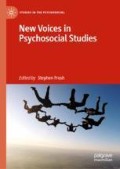Abstract
Iulia Minulescu offers a critique of psychoanalysis through examining how the concept of subjectification has evolved. Minulescu explores subjectification through the prism of philosophical and psychoanalytical discourse, using the theories of Foucault and of Freud and Lacan, respectively. She shows that the language used in Freudian and Lacanian psychoanalysis to explain the genesis of the subject cannot claim universality. Despite intricate attempts to portray unique human subjectivity as enduring through time and space, psychoanalysis’ account of what it is to be a subject is historically determined and encompasses only a fraction of the modes of subjectification open to the subject.
Access this chapter
Tax calculation will be finalised at checkout
Purchases are for personal use only
Notes
- 1.
Foucault does not refer to subjects as subjects, but uses the more general term Man. I believe the terminology is not accidental and captures the cultural baggage of the term. Note the use of a gendered word, particularly with a view to Irigaray’s argument that history and philosophy orchestrate culture from a male viewpoint. In contrast, psychoanalysis refers to ‘subjects’ and argues for their ahistorical nature, making Foucault’s ‘Man’ equivalent to ‘subject’, especially when unpacked through the Irigarayan lens.
- 2.
In ‘Science and Truth’, Lacan (1989) discusses the importance of history in the definition of the subject and the issues that stem from the Cartesian splitting of the subject. He understands psychoanalysis as always bound with history and rejects the idea that it can reveal universal truths. From this perspective, it would be wrong to suggest that Lacan is not attuned to the part history plays in shaping the subjects of psychoanalysis. However, what I am suggesting is that he does not consider sufficiently the way psychoanalysis, in adopting a male subject-position, perpetuates a certain type of history, becoming divorced from the historicity of the quasi-transcendental elements that constitute the lifeworld of subjects. To an extent, universal truths shape history from without, as they exist independently of history. Psychoanalysis is different, as it does not seek to make universal claims about the scientific nature of subjects. Yet, in allowing for the existence of only one subject-position (male), psychoanalysis imposes fixity in the process of subjectification from within: It becomes a universalising metalanguage that only allows one form of subjectivity to speak, thus instilling rigidity at the core of the subject similar to that inherent in axiomatic propositions.
References
Dreyfus, H. L., & Rabinow, P. (1983). Michel Foucault: Beyond Structuralism and Hermeneutics (2nd ed.). Chicago: University of Chicago Press.
Fink, B. (2004). Lacan to the Letter: Reading Ecrits Closely. Minneapolis: University of Minnesota Press.
Foucault, M. (1989). The Order of Things: An Archaeology of the Human Sciences. London: Routledge.
Grosz, E. (1990). Jacques Lacan: A Feminist Introduction. London: Routledge, Taylor & Francis.
Heidegger, M. (1962). Being and Time. New York: Harper & Row.
Irigaray, L. (1985a). Speculum of the Other Woman. Ithaca: Cornell University Press.
Irigaray, L. (1985b). This Sex Which Is Not One. Ithaca: Cornell University Press.
Irigaray, L., & Whitford, M. (1991). The Irigaray Reader. Oxford: Blackwell.
Johnston, A. (2018). Jacques Lacan. In E. N. Zalta (Ed.), The Stanford Encyclopedia of Philosophy (Fall ed.). https://plato.stanford.edu/archives/fall2018/entries/lacan/.
Kant, I., & Smith, N. K. (2007). Critique of Pure Reason (Rev. 2nd ed.). New York: Palgrave.
Lacan, J. (1989). Science and Truth. Newsletter of the Freudian Field, 3 (Spring/Fall), 4–29.
Perelberg, R. J. (Ed.). (2005). Freud: A Modern Reader. London: Whurr.
Rothstein, A. (2010). Making Freud More Freudian. London: Karnac Books.
Author information
Authors and Affiliations
Editor information
Editors and Affiliations
Rights and permissions
Copyright information
© 2019 The Author(s)
About this chapter
Cite this chapter
Minulescu, I. (2019). On Becoming a Subject. In: Frosh, S. (eds) New Voices in Psychosocial Studies. Studies in the Psychosocial. Palgrave Macmillan, Cham. https://doi.org/10.1007/978-3-030-32758-3_4
Download citation
DOI: https://doi.org/10.1007/978-3-030-32758-3_4
Published:
Publisher Name: Palgrave Macmillan, Cham
Print ISBN: 978-3-030-32757-6
Online ISBN: 978-3-030-32758-3
eBook Packages: Behavioral Science and PsychologyBehavioral Science and Psychology (R0)

